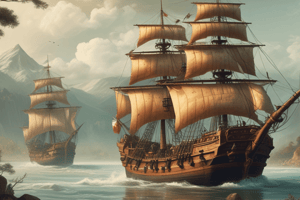Podcast
Questions and Answers
The transfer of plants, animals, diseases, and technology between the Old World and the New World is known as the ______ Exchange.
The transfer of plants, animals, diseases, and technology between the Old World and the New World is known as the ______ Exchange.
Columbian
The economic system where colonies supply raw materials to the mother country, which then sells finished goods back to the colonies, is called ______.
The economic system where colonies supply raw materials to the mother country, which then sells finished goods back to the colonies, is called ______.
mercantilism
The ______ colonies, including Massachusetts and Connecticut, were characterized by shipbuilding, fishing, trade, and strong Puritan religious influence.
The ______ colonies, including Massachusetts and Connecticut, were characterized by shipbuilding, fishing, trade, and strong Puritan religious influence.
New England
England's policy of ______, where they loosely enforced trade regulations in the colonies, allowed the colonies to develop a sense of self-governance prior to the American Revolution.
England's policy of ______, where they loosely enforced trade regulations in the colonies, allowed the colonies to develop a sense of self-governance prior to the American Revolution.
The first written constitution in America, which established a more democratic government than what was present in England at the time, was the Fundamental Orders of ______.
The first written constitution in America, which established a more democratic government than what was present in England at the time, was the Fundamental Orders of ______.
Flashcards
3 G's
3 G's
Motivations for early European exploration of the New World; God, Gold, and Glory.
Columbian Exchange
Columbian Exchange
The exchange of plants, animals, diseases, and technologies between the Old World (Europe, Africa, Asia) and the New World (Americas) after 1492.
Jamestown
Jamestown
First permanent English settlement in North America (1607), initially plagued by hardship.
Mercantilism
Mercantilism
Signup and view all the flashcards
Salutary Neglect
Salutary Neglect
Signup and view all the flashcards
Study Notes
- 8th-grade U.S. History Unit 1 typically covers Exploration and Colonization from 1492–1763.
Early Exploration (1492–1607)
- Primary motivations included spreading religion ("God"), acquiring wealth ("Gold"), and achieving fame ("Glory").
- Major European powers involved were Spain, France, and England.
- The Columbian Exchange involved the transfer of plants, animals, diseases, and technology between the Old World and the New World.
Colonization (1607–1763)
- Jamestown, established in 1607, was the first permanent English settlement, which initially faced hardships like disease and starvation.
- Plymouth Colony, established in 1620, was founded by Pilgrims seeking religious freedom.
- The 13 Colonies were divided into three regions: New England, Middle, and Southern.
- New England Colonies had economies based on shipbuilding, fishing, and trade, and were influenced by Puritan religious beliefs.
- Middle Colonies, known as the "Breadbasket Colonies," featured diverse economies and religious tolerance.
- Southern Colonies had plantation economies based on cash crops such as tobacco, rice, and indigo, which relied on slavery.
Colonial Government & Economy
- Mercantilism was the economic system where colonies supplied raw materials to England.
- The Mayflower Compact, created in 1620, was an early form of self-government in Plymouth.
- The Virginia House of Burgesses, established in 1619, was the first representative government in the colonies.
- The Fundamental Orders of Connecticut, adopted in 1639, marked the first written constitution in America.
Slavery & Indigenous Relations
- The Transatlantic Slave Trade involved the forced movement of Africans to work in the colonies.
- Native American Conflicts included the Pequot War, King Philip’s War, and displacement because of European expansion.
Causes of the American Revolution
- Salutary Neglect was a period when England ignored the colonies, which allowed them self-rule, but later tightened its control.
- The Navigation Acts restricted colonial trade to benefit England.
- The French and Indian War (1754–1763) put Britain in debt, resulting in taxes being levied on the colonies.
Studying That Suits You
Use AI to generate personalized quizzes and flashcards to suit your learning preferences.



